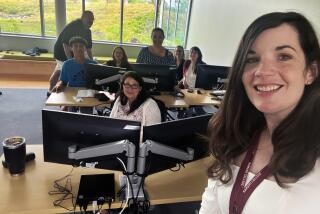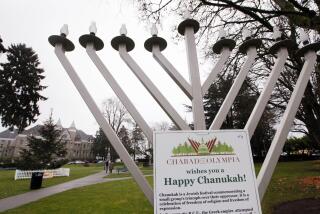Resources Feed Search for the Past : Genealogy: Looking up one’s past relations can be tricky, especially with name changes in the Jewish experience. But two sleuths will teach others about resources.
Herb Mautner and Geraldine Winerman search for clues the way the best detectives do. They ask a lot of questions, consider at length even the most remote possibilities and never give up. As genealogists, what they want to discover is anything about their families’ pasts.
Mautner, 66, a retired industrial engineer, has spent thousands of hours over the past 16 years tracking down about 2,000 of his ancestors from the last 10 generations.
Winerman, 49, has made less progress--she has been researching her roots only since 1983. But, she says, “I’ve been bitten by a genealogy bug that won’t let go.
“My mind is whirling on a constant basis. I’m constantly thinking, ‘What can I do to find this tidbit of information?’ ”
Mautner and Winerman have started to research their spouses’ relatives. “I think it’s terrific. It’s the first time she’s been really interested in something,” said Winerman’s husband, Gerald, an administrative law judge.
Mautner’s wife of 41 years, Maryanne, is equally enthusiastic. So far, Mautner has uncovered the genealogy of Maryanne Mautner’s four grandparents.
Mautner and Winerman met by chance through the Los Angeles Jewish Genealogical Society. They began teaching a class on Jewish genealogy in the spring of 1988 at Valley Cities Jewish Community Center in Van Nuys and will be conducting another session in early November.
The goal of the 12-hour course, presented over five sessions, is to inform students of the resources available to help them discover their family heritage. Students are also taught how to effectively use these resources.
Many people assume that Jewish genealogy is impossible because many of the records have been destroyed, but Winerman says it’s just a matter of knowing where to look.
One of the most outstanding centers for this type of research is the Los Angeles Family History Library in West Los Angeles, which is owned and operated by the Mormon Church.
With more than 65,000 reels of microfilm, 30,000 sheets of microfiche and 12,000 books, the library is the second-largest of its kind in the country. (The largest genealogy library, also owned by the Mormons, is in Salt Lake City.)
Because of the Mormons’ strong belief in keeping the family together, they have traditionally tried to preserve genealogical records and assist others in learning about their family heritage.
The library in West Los Angeles has seen a 35% to 50% increase in the number of people using its facilities over the past two years, said librarian Dora Holt.
Because of this increased interest in genealogy, the library extended its hours about a year and a half ago. In addition, Holt added, to accommodate the large volume of visitors, the library no longer closes for two weeks in August and December, as it used to do.
Holt said a recent issue of Reader’s Digest stated that genealogy has replaced stamp collecting as the No. 1 hobby in the United States.
Writing personal histories, which can be passed down from one generation to another, has also become popular, and many of the people who visit the Family History Library are involved in compiling such documents. When asked why they search for their roots, many enthusiasts say they got hooked after talking with someone who was already involved in genealogy.
Last year, the Family History Library acquired documents confiscated by the U.S. government in 1928 from Russian consulates in seven U.S. cities. The records cover 1870 to 1914 and include valuable information about Russian Jews who contacted the consulates during that period. The consular documents were transferred to about 145 reels of microfilm in 1986, Holt said.
Because of the various reference texts and documents the library houses, Mautner and Winerman present a special four-hour session there as part of their course. They also make use of a variety of published resources, including the Jewish Family Finder, a New Jersey computer listing composed of about 1,150 genealogists, 7,200 surnames and 4,000 towns. Such publications provide a way for those studying genealogy to link up with others across the country who share their interest.
When the Los Angeles Jewish Genealogical Society was established in 1979, there was only one other organization of its kind, in New York City. Since then, 35 other Jewish genealogy societies have sprung up, including ones in Holland, France and Switzerland.
One of the major difficulties facing Jewish genealogists is that Jews frequently changed their names, especially during times of persecution. Jewish family names have only existed about 200 years, Mautner explained. Before then, the names were mainly Hebrew.
But even if a person’s ancestors changed their names, Mautner and Winerman have several suggestions for genealogists.
First, they recommend asking lots of questions of the oldest relatives. With reference to the town a family came from, it’s important to get not only the name of the town but also the specific location, because there were often several towns by the same name.
Check official documents, such as the U.S. Census and birth, marriage and death certificates. Also, find out if there were rabbis in the family, because rabbis keep genealogical records, some as far back as 1,000 years.
Once people start to gather facts about their families, they’ll usually need to practice more than a bit of patience, the pair say. When Mautner was working, every day during lunch he would write one letter, as part of his search for his roots. One time, he contacted the Czechoslovakian Embassy and had to wait about 2 1/2 years for a reply. After paying them $200, Mautner received a list of 40 of his ancestors. In his opinion, the fee was well worth it.
“You have to have a little luck,” Mautner said. “But sometimes, you hit a dead area. Then you can go for hours, days and weeks and not find anything.”
Learning about one’s family can be an eye-opening experience, too--sometimes pleasant, sometimes not. “We all find skeletons in our closet,” Winerman said.
When she was investigating her family’s past, Winerman learned through an old newspaper clipping about one relative who, as a young man, married a woman in her 60s. Subsequently, Winerman’s relative gambled and lost all his wife’s money on horses. “Eventually, he became a mailman and settled down,” she said with a laugh.
However, she also learned of ancestors who were Sephardic Jews living in Spain in the 1600s. “These people could not openly practice their religion, so they had to do it secretly,” Winerman said. “If they were caught, they would have been persecuted or even executed.”
She also learned that some relatives died in Nazi concentration camps. “Learning all of this made me feel much more connected with my Judaism. Finding out that my family remained Jewish, what they did despite all the persecutions, made me proud,” she said.
Genealogy seems to lead to stronger family ties.
After taking Mautner and Winerman’s class, Eileen Wasserman, 40, of West Los Angeles, began to contact relatives she hadn’t seen in 20 or 30 years.
“It’s brought me much closer to family members I hadn’t been emotionally close to,” Wasserman said. “It’s added so much to my life.”
And for Dr. Hillel Lazarus, 53, of North Hollywood, the result was much the same. After writing an 800-page family history that included 1,100 photos, Lazarus planned a family reunion, which was held Memorial Day. The event attracted 130 guests, some of whom Lazarus had not seen in 30 years. “It made me feel great,” Lazarus said. “It gave us all a sense of togetherness. It was a good way to expose the younger generations to the family.”
More to Read
Sign up for Essential California
The most important California stories and recommendations in your inbox every morning.
You may occasionally receive promotional content from the Los Angeles Times.










